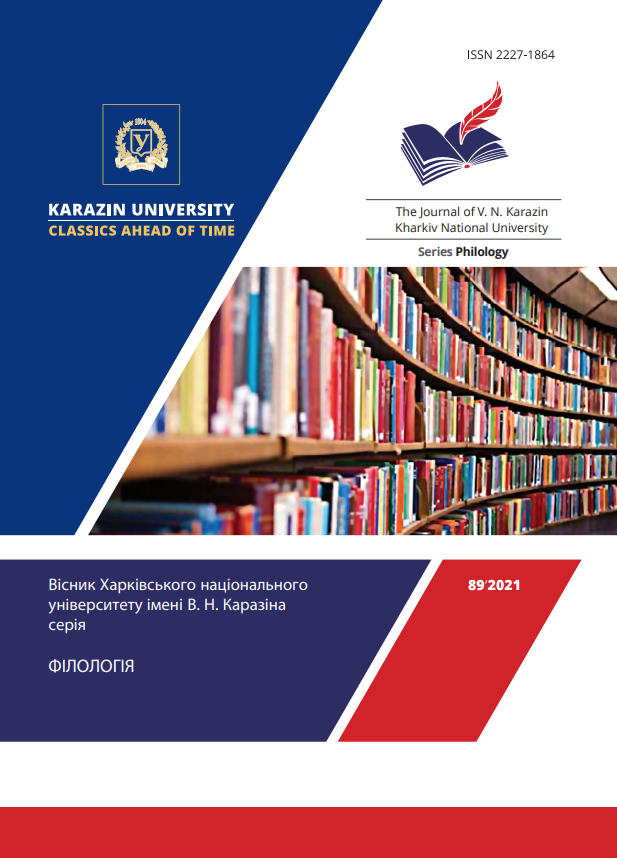Екзистенціалістський інтертекст роману Дж. Фаулза «Колекціонер»
Анотація
Мета статті – окреслити складові екзистенціалістського інтертексту роману Дж. Фаулза «Колекціонер»; розглянути ті аспекти, що залишилися на периферії уваги дослідників, зосередившись на автентичності образу Міранди; виявити семантичні трансформації претекстів у зазначеному дискурсі; розглянути інтертекстуальність та інтермедіальність як основні прийоми створення екзистенціалістського інтертексту.
Образ Міранди Грей, близький до «альтер-его» письменника, вважаємо інтертекстуально-композитним конструктом. Його семантичною домінантою, що вбирає в себе інші дискурси, вважаємо екзистенціальність. Виявлено, що Міранда як автентична особистість відзначається схильністю до самоідентифікації; потягом до свободи і трансценденції у різноманітних вимірах; здатністю до індивідуалізації творчої діяльності і мислення; усвідомленням особистої смертності. Підкреслено інноваційність створеної Дж. Фаулзом концепції особистості, маркер автентичності якої репрезентований в гендерному аспекті як усвідомлена «жіноча сила».
Доведено майстерність Дж. Фаулза у «балансуванні» між зовнішнім та внутрішнім у створенні екзистенціалістського інтертексту твору, що оприявнено в його образній системі. Автор моделює взаємини між Мірандою, Клеггом та Пестоном як боротьбу дівчини за автентичність жіночої особистості проти «маскулінного диктату». Інтерпретація низки ситуацій («учитель ¬– учень», «справжній творець – імітатор», «переслідувач – жертва»; «мадонна – блудниця», «Пігмаліон – Галатея», паттерн «втраченого раю», ілюзорне втілення фантазій за типом «princesse lointaine» тощо) засвідчує парадоксальне зближення цих аксіологічно протилежних особистостей.
Імпліцитне використання прийому інтертекстуальності (алюзій, цитат) маркує Дж. П. та Клегга амбівалентними персонажами, демонструючи їхню двоплановість у моделі зовнішнє / внутрішнє. Для створення екзистенціального інтертексту Дж. Фаулз застосовує різні типи екфрасису (імліцитний, атрибутивний, уявний), що виконують характерологічні, метапоетичні, естетичні, символіко-алегоричні функції. Інтертекстуальність (інтермедіальність) сприяє текстотворенню та генеруванню смислів.
Завантаження
Посилання
Godovannaya, E. M. (2004). Filosofsko-esteticheskiye dominanty russkogo i yevropeyskogo postmodernizma i tvorchestvo Dzhona Faulza [Philosophical and aesthetic dominants of Russian and European postmodernism and the work of John Fowles]. Extended abstract of Candidate’s thesis. Kuban. gos. un-t. Krasnodar. 19 p. [in Russian].
Devdiuk, I. V. (2020). Ekzystentsiynyy dyskurs v ukrayinsʹkiy ta brytansʹkiy prozi mizhvoyennoho periodu [Existential Discourse in the Ukrainian and British Prose Works of the Interwar Period]. Monograph. Ivano-Frankivsʹk: Vydavetsʹ Kushnir H. M. 484 p.[ in Ukrainian].
D'yavol'skaya inkvizitsiya : Dzhon Faulz i Dianne Vipond (1995) [The Devil’s Inquisition: John Fowles and Dianne Vipond]. Faulz D. Krotovyye nory: ctat'i. – Fowles D. Wormholes: Essays and Occasional Writings. Moscow : Eksmo; SPb : Domino, 2008. P. 633– 665. [in Russian].
Zhluktenko, N. Yu. (1988). Angliyskiy psikhologicheskiy roman XX veka [English psychological novel of the XX century]. Kyiv : Vyshcha shk. Izd-vo pri Kiyev, un-te. 160 p. [in Russian].
Zhluktenko, N. Yu. (1987). Problema gumanizma v proze Dzhona Faulza [The problem of humanism in the prose of John Fowles]. Literatura Anglii. XX vek – Literature of England. XX century / pod red. K. A. Shakhovoy. Kyiv. P. 370–395 [in Russian].
Zhuchkova, A. V., Demidova, Ye. O. (2015). Oppozitsiya «nemnogiye-mnogiye» v khudozhestvennoy kontseptsii Dzh. Faulza [Opposition “few-many” in the artistic concept of J. Fowles]. Vestnik RUDN. Seriya Literaturovedeniye. Zhurnalistika. № 2. P. 60–65. [in Russian].
Ilinska, N. I. (2021). Roman Dzhona Faulza «Kolektsioner» u paradyhmi «podviynoho koduvannya» [John Fowles’ novel “The Collector” in the paradigm of “double coding”]. Pivdennyy arkhiv (filolohichni nauky): Zbirnyk naukovykh pratsʹ. – Southern Archive (philological sciences): Collection of scientific works. Vypusk LXXXVI. Kherson: KSU. P. 45–53. DOI: https://doi.org/10.32999/ksu2663-2691/2021-86-7 [in Ukrainian].
Kozyura, O. V. (2006). Proza Dzhona Faulza : aspekty postmodernist•sʹkoyi interpretatsiyi [Prose of John Fowles: aspects of postmodern interpretation]. Extended abstract of Candidate’s thesis. Kyiv. 20 p. [in Ukrainian].
Pavlychko, S. (2001). Dzhon Faulz. Zhyttya yak mahichnyy teatr. [John Fowles. Life as a magical theater.] Zarubizhna literatura : Doslidzh. ta krytychni statti. – Foreign Literature: Research and critical articles / peredm. D. Nalyvayko. Kyiv : Vyd-vo Solomiyi Pavlychko «Osnovy», 2001. P. 359–391. [in Ukrainian].
Papkina, D. S. (2005). Shekspirovskiye allyuzii v proze Dzhona Faulza [Shakespearean allusions in the prose of John Fowles]. Candidate’s thesis. Moscow : RGB. 173 p. Retrieved from : http://diss.rsl.ru/diss/05/0027/050027042.pdf [ in Russian].
Paramonov, B. (1999). Po povodu Faulza [Concerning Fowles]. Zvezda. – Star. № 12. Retrieved from : https://magazines.gorky.media/zvezda/1999/12/po-povodu-faulza.html [in Russian].
Piege-Gro, N. (2008). Vvedeniye v teoriyu intertekstual'nosti [Introduction to the theory of intertextuality]. Moscow: Izd-vo LKI. 240 p. [in Russian].
Ratskiy, I. (2006). «Burya» U. Shekspira [The Tempest by W. Shakespeare]. The Tempest: Tragikomediya. / per. s angl. M. Donskogo, vstup. st. I. Ratskogo. SPb : Azbuka-klassika. P. 151–214. [in Russian].
Ternovaya, T. Yu. Shekspirovskiye motivy v romane Dzhona Faulza «Kollektsioner» [Shakespearean motives in the novel by John Fowles “The Collector”]. Retrieved from : http://dspace.nbuv.gov.ua/bitstream/handle/123456789/76158/11-Ternovaya.pdf?sequence=1 [ in Russian].
Trubina, Ye. G. (2008). Autentichnost' [Authenticity]. Sovremennyy filosofskiy slovar'. – Modern philosophical dictionary. Moscow : Panprint. Retrieved from : https://encyclopedia_philosophy.academic.ru/43/ [in Russian].
Fowles, J. (2014). Daniel Martin. Moscow : AST Litagent. 1100 p. Retrieved from : https://bookshake.net/b/deniel-martin-dzhon-robert-faulz [in Russian].
Fowles, J. (2017). Kolektsioner: roman [The Collector]. Kharkiv : Knyzhkovyy Klub «Klub Simeynoho Dozvillya». 304 p. [in Ukrainian].
Bagchee, S. (1980). “The Collector”: The Paradoxical Imagination of John Fowles. Journal of Modern Literature, vol. 8, no. 2. P. 219–234. Retrieved from : www.jstor.org/stable/3831229 [in English].
Beatty, P. V. (1982). John Fowles’ Clegg: Captive Landlord of Eden. Ariel. vol. 13, no. 3, Р. 73–81. Retrieved from : https://journalhosting.ucalgary.ca/index.php /ariel/article/view/32702 [in English].
Conversations with John Fowles (1999). Ed. by Dianne L. Vipond. University Press of Mississipi. 243 р. [in English].
Cooper, P. (1991). The Fictions of John Fowles : Power, Creativity, Femininity. Canada : University of Ottawa Press. 232 p. Retrieved from : https://book4you.org/book/2483240/6500d1 [in English].
Frye, N. (1967). Fools of Time. Studies in Shakespeare’s Tragedies. Toronto. 201 p. [in English].
Jódar, A. R. (2006). “A Stranger in a Strange Land”: An Existentialist Reading of Fredrick Clegg in “The Collector” by John Fowles. Atlantis, vol. 28, no. 1. P. 45–55. Retrieved from : www.jstor.org/stable/41055228 [in English].
Kermode, F. (2000). Shakespeare’s Language. London: Published by the Penguin Books. 324 p. [in English].
Partridge, A. C. (1971). The Language of Renaissance Poetry. London. 133 p. [in English].
Salami, M. (1992). John Fowles’s Fiction and the Poetics of Postmodernism. Plainsboro: Associated University Presse. 302 p. Retrieved from : https://books.google.com.ua/books/about/John_Fowles_s_Fiction_and_the_Poetics_of.html?id=EquizXeXb3kC&redir_esc=y [in English]




